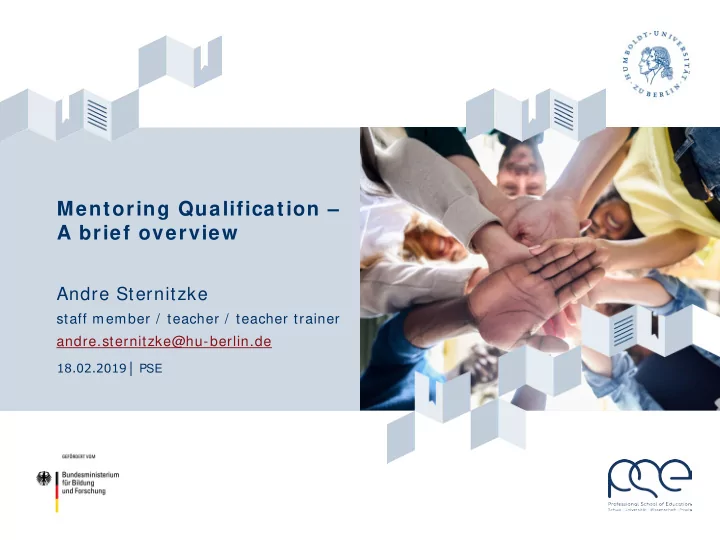

Mentoring Qualification – A brief overview Andre Sternitzke staff member / teacher / teacher trainer andre.sternitzke@hu-berlin.de 18.02.2019│ PSE
Table of content 1) Practical studies (internship) • General aspects − Chronological overview − Practice-orientated activities − Contributors • Internships at Stellenbosch University 2) Mentoring qualification • Qualification courses for teachers - content • General procedure at the Humboldt-University Berlin • tasks of a mentor 1 Hier steht z.B. der Titel der Präsentation (über Kopf- u. Fußzeile eintragen)
Table of content 3) Video example of a co-constructive talk 4) Characteristics of con-constructive talks • Coaching moves • Effects 5) Q & A 2 Hier steht z.B. der Titel der Präsentation (über Kopf- u. Fußzeile eintragen)
Practical studies (internship) inherent part of the Master of Education studies since 2016 usually takes place in the third semester of the master‘s studies goal: • to bridge the gap between university and school and make the transition easier for future teachers 3
Chronological order orientation internship during the bachelor‘s program • 6 weeks • focus: lesson observaion practical studies ( internship) in Berlin • 5 months (01.09. – 31.01.) / 18 weeks (without holidays) • in the 3rd semester of the master‘s studies, during the winter semester teacher training • 18 months 4
Practice-orientated activities School: lesson observation (sitting in on classes) simple tasks during the class, for example supporting individual students taking part in and contributing to general school life (extracurricuclar activities, conferences, staff meetings,… ) preparation, execution and evaluation of 32 instructed lessons University: carrying out a research project attending accompanying seminars 5
Contributors within the practical studies university students university teachers mentors (school teachers) 6
Internships at your faculty - Which role do practical studies play at your university? - To which extent do your requirements differ from those in Berlin? - What else is of interest to you? 7
Mentoring qualification: a Berlin-wide project Professional School of Education (PSE) Dahlem School of Education (DSE) School of Education der TU Berlin (SETUB) Zentrum für künstlerische Lehrkräftebildung (zfkl) 8
Qualification course for teachers - content • general information • communication process (active listining, question techniques, methods and strategies for overcoming problematic situations in conversations) • techniques and methods to carry out a co-constructive discussion before the lesson • techniques and methods to carry out co-constructive evaluation talk after the lesson 9
Tasks of a mentor Planning, execution and reflection of lessons Focus: Support the execution of lessons The m entors … provide insight into their own planning process, their teaching and in the process of evaluating lesson (and serve as role models). … let students take over parts of their lessons to create learning opportunities (team teaching). … support the students‘ planning, execution and reflection of lessons by conducting co-constructive discussions before and after the lessons. 10
Example of a co-constructive talk before the lesson Please watch the video and observe the way the talk is carried out. • What do you notice in terms of the way the conversation is carried out. • What do you find particularly positive about the taped coaching session? 11
Co-construcive conversation – characteristics mentor guides through the talk student as well as mentor contribute to the discussion (ask questions, make suggestions) • mutual lesson planning and development of new ideas • mutual evaluation of the conducted lesson dialogic interaction (long monologues should be avoided) certain coaching moves should be used Kreis & Staub, 2011; West & Staub, 2003 12
Co-constructive lesson talks – guidelines suggestion: every second lesson should be discussed co- constructivly time for talks before the lesson: maximum 45 minutes time for talks after the lesson : 30 minutes 13
Coaching moves inviting coaching m oves • questions, requests, active listening • e.g.: „ What difficulties could the students have with the task?“ indicating coaching m oves • Questions to point out certain aspects • e.g.: „ What is the difference between the graphic and the table? It should be clear to us .“ coaching m oves to ensure understanding • demands, paraphrasings, summarys, explicit wording of arrangements • e.g.: „ Is this what you meant ?“ Kreis & Staub, 2013; Staub, 2004; Staub & Kreis, 2013 14
Examples of the video 15
Examples of the video 16
Examples of the video 17
Effects of co-constructive lesson discussions − co-constructive discussions before the lesson is hold evoke twice as many learning achievements as debriefings − discussion longer than one hour are no longer effective Futter & Staub, 2008; Kreis, 2012; Kreis & Staub, 2011; Staub & Kreis, 2013 18
Thank you for your attention. Feel free to ask questions!
contact Andre Sternitzke Team Mentoringqualification Professional School of Education (PSE) Humboldt-Universität Berlin Telefon: + 49 (0)30 2093 70824 E-Mail: andre.sternitzke@hu-berlin.de
Recommend
More recommend